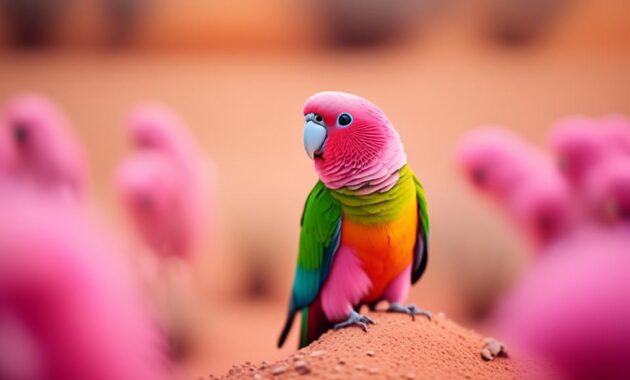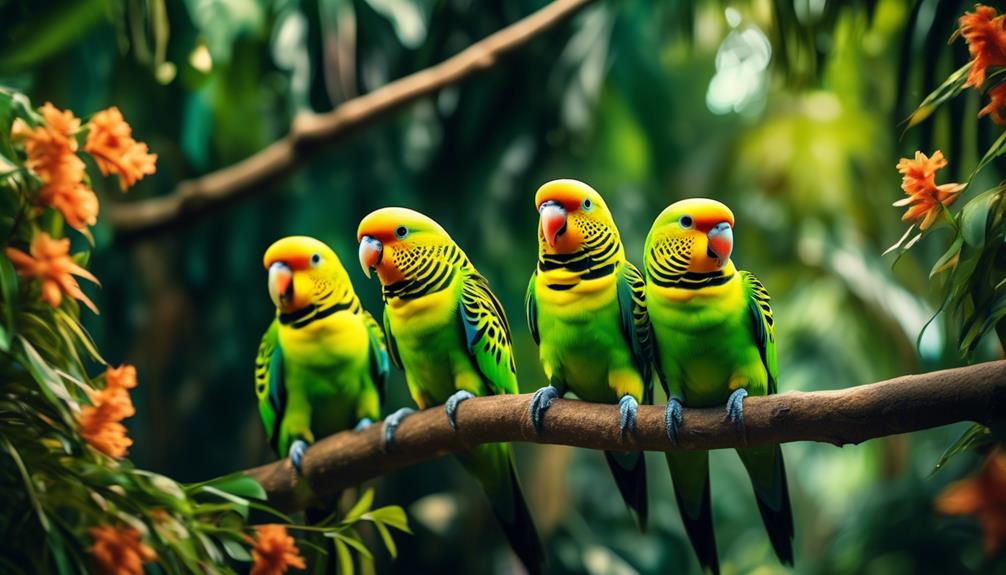
Did you know that Regent Parakeets are not only visually stunning but also incredibly intelligent? These charming birds have been observed using tools in the wild, a behavior that is quite rare among avian species.
But their intelligence is just one aspect of their captivating world. From their unique vocalizations to their playful and curious nature, there is so much more to discover about these enchanting creatures.
So, join us as we uncover the fascinating world of Regent Parakeets and delve into their captivating behaviors and mesmerizing beauty.
Key Takeaways
- Regent Parakeets are medium-sized birds native to southwestern Australia, known for their vibrant plumage and colorful appearance.
- They have the ability to learn a few words and mimic familiar household sounds, making them delightful companions with vocal talents.
- Proper care and feeding include providing a balanced diet, fresh water sources, regular showers, and a spacious cage for freedom of movement.
- Health and happiness of Regent Parakeets are promoted through regular exercise, flight time in a safe area, interactive toys, and avoiding boredom.
Description and Habitat of Regent Parakeets
Regent Parakeets, native to southwestern parts of Australia, are medium-sized birds with rounded chubby bodies, shorter tails, and distinct small and sharp beaks. These colorful parakeets measure about 16 inches in size and have a lifespan of 25 to 30 years.
They’re known for their vibrant plumage and can be found in dense shrublands, woodlands, and eucalyptus groves. Regent Parakeets are often seen in small flocks of 20 to 100 birds and are considered one of the best flying birds in Australia.
They primarily search for seeds and water sources to fulfill their dietary needs. Males and females have slight color differences, and their vocal and energetic nature makes them a charming addition to any household.
Sounds and Speech of Regent Parakeets
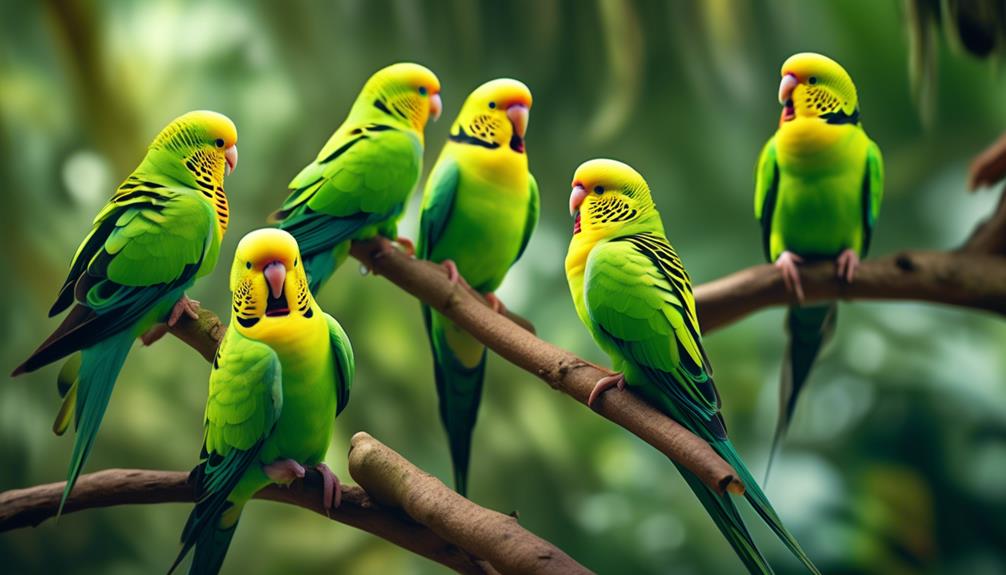
After learning about the description and habitat of Regent Parakeets, it’s time to explore their fascinating sounds and speech.
- These vocal and energetic birds can learn a few words and mimic familiar household sounds, adding a touch of charm to their already captivating presence.
- With some training, they can even be taught to whistle, showcasing their intelligence and adaptability.
- However, it’s important to note that apartment settings may not be ideal for chatty parakeets, as their lively nature might disturb neighbors.
Regent Parakeets have a unique ability to communicate and interact with their surroundings, making them delightful companions for those who appreciate their vocal talents.
Care and Feeding of Regent Parakeets
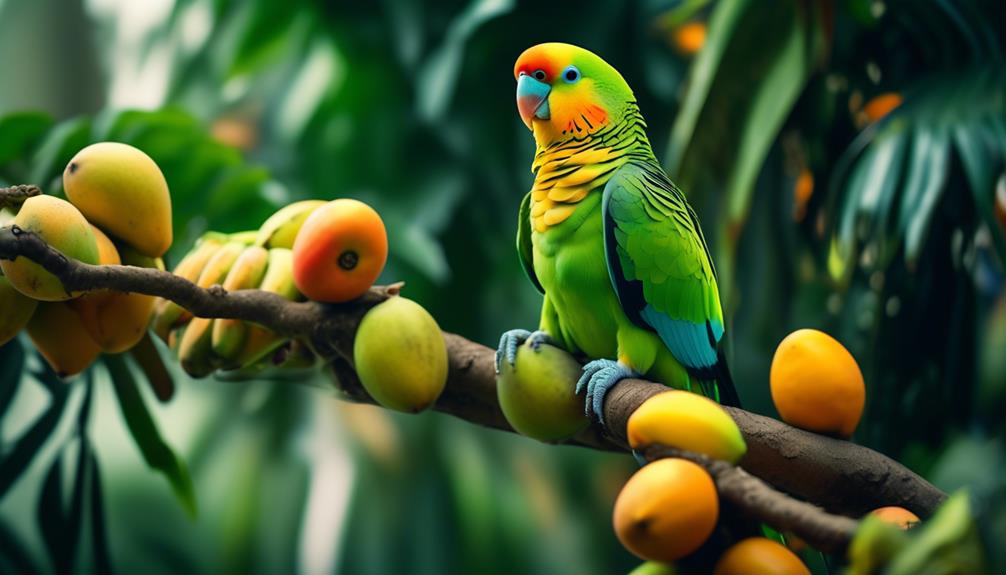
To properly care for and feed your Regent Parakeet, it’s important to provide them with a balanced diet and a spacious environment that allows for freedom of movement.
Start by offering regular seed mixes specifically made for parakeets. These can be supplemented with fresh fruits, nuts, and vegetables to ensure a varied and nutritious diet. Remember to replace their fresh water sources daily to maintain their health and hydration.
Additionally, provide them with regular showers for bathing to keep their feathers clean and healthy.
It’s crucial to provide a spacious cage that allows for plenty of room to fly and move around, as Regent Parakeets are excellent flyers and need regular exercise.
Health and Exercise of Regent Parakeets
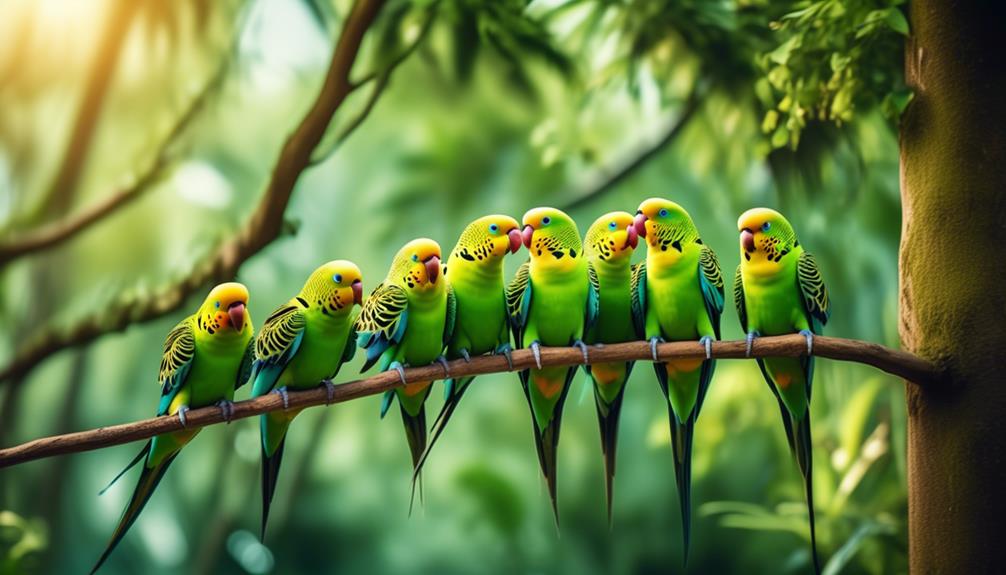
Now let’s shift our focus to the importance of maintaining the health and promoting exercise for your beloved Regent Parakeet. To ensure that your parakeet stays healthy and happy, it’s crucial to provide them with proper care and plenty of exercise. Here are a few guidelines to follow:
- Offer a spacious cage: Your Regent Parakeet needs enough room to move around and stretch their wings. A cage that’s too small can lead to boredom and health issues.
- Encourage flight time: Regent Parakeets are excellent flyers, so give them the opportunity to spread their wings. Allow them to fly around in a safe and secure area.
- Provide interactive toys: Engage your parakeet in playtime with toys that encourage physical activity. Toys that require climbing, swinging, and foraging can keep them active and entertained.
Personality and Behavior of Regent Parakeets
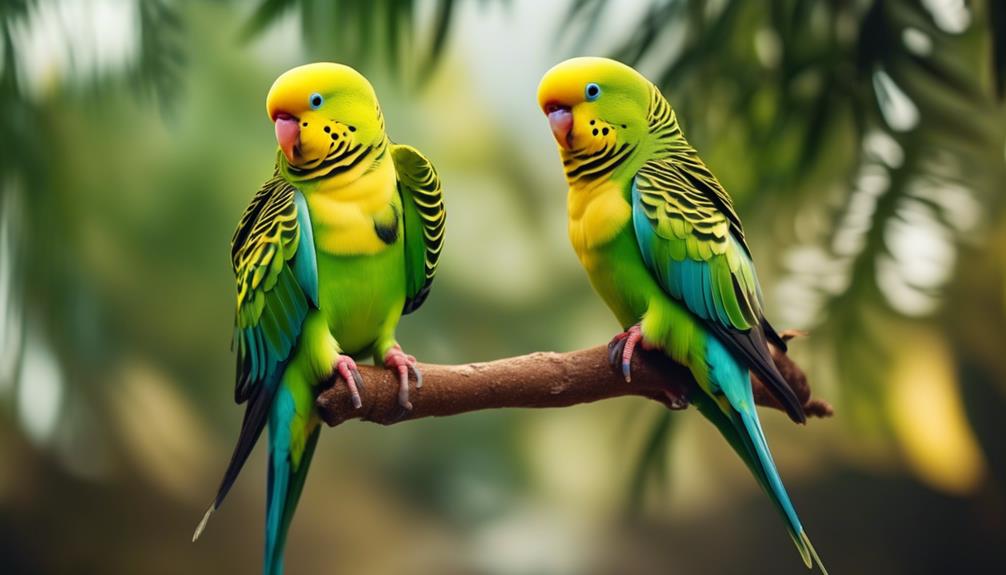
Regent Parakeets are known for their charming and playful personalities. These docile and affectionate parrots form strong bonds from an early age and exhibit energetic and funny behavior. They love to play with toys and interact with their human companions.
Providing them with a spacious cage and freedom of movement is essential for their happiness and well-being. Regent Parakeets are suitable for aviaries and can also make wonderful companion parrots. They enjoy social interaction and thrive in environments where they can receive attention and care.
If you’re looking for a bird that will bring joy and entertainment into your life, the Regent Parakeet is an excellent choice.
Bonding and Social Interaction With Regent Parakeets
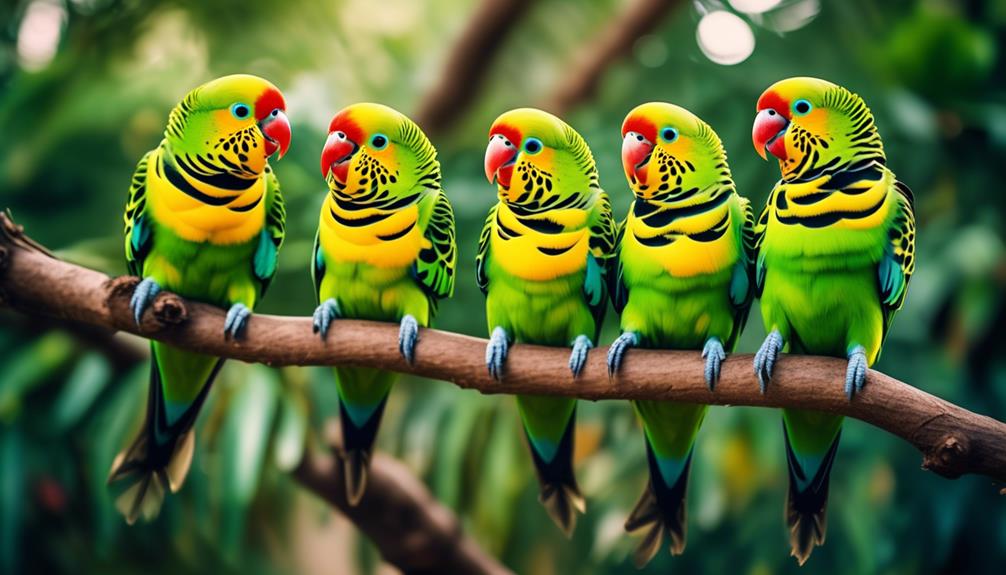
If you’re interested in building a strong bond with your Regent Parakeet and fostering social interaction, it’s important to understand their natural behaviors and needs.
Here are some tips to help you connect with your feathered friend:
- Spend quality time together: Regent Parakeets thrive on social interaction, so make sure to spend time with your bird every day. Talk to them, play with them, and let them explore their surroundings under your supervision.
- Offer treats and rewards: Positive reinforcement goes a long way in strengthening the bond with your Regent Parakeet. Use treats and rewards to encourage good behavior and help them associate you with positive experiences.
- Create a stimulating environment: Regent Parakeets are curious and intelligent birds. Provide them with plenty of toys, puzzles, and activities to keep them mentally stimulated and entertained.
Regent Parakeets as Aviary Birds
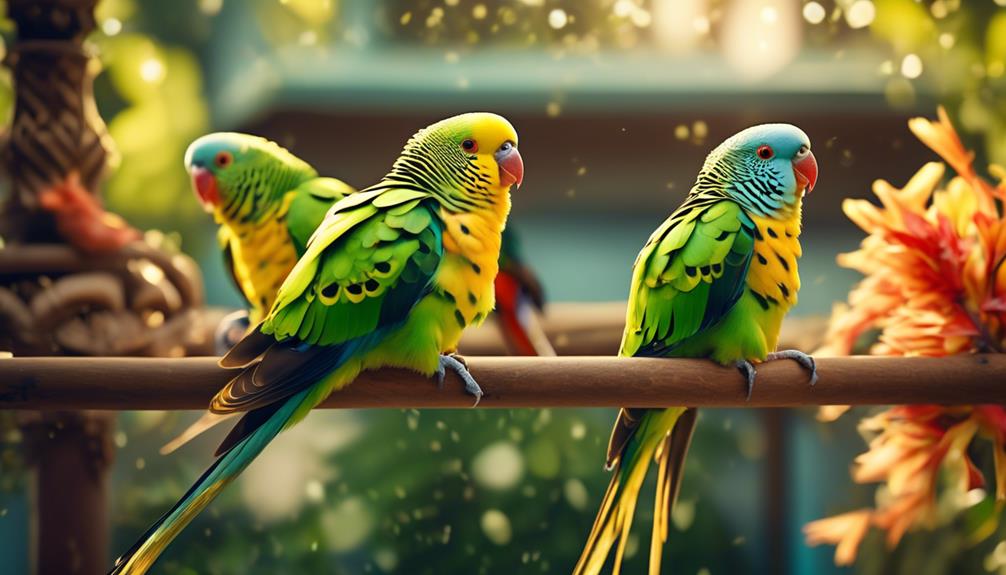
One of the key considerations when keeping Regent Parakeets is their suitability as aviary birds. These vibrant and social creatures thrive in spacious environments where they can fly, interact, and exhibit their natural behaviors. Aviaries provide the perfect setting for Regent Parakeets to spread their wings and enjoy a fulfilling life. Here is a table highlighting some important aspects of keeping Regent Parakeets in aviaries:
| Aspects | Description |
|---|---|
| Space | Aviaries should be large enough to allow for free flight and movement |
| Social Interaction | Regent Parakeets enjoy the company of their own kind and other birds |
| Enrichment | Provide plenty of toys and perches to keep them mentally stimulated |
| Natural Environment | Mimic their native habitat by including plants and branches for climbing |
Regent Parakeets as Companion Parrots

When considering a companion parrot, the delightful and sociable nature of Regent Parakeets makes them an excellent choice. Here are three reasons why they can be a perfect addition to your home:
- Regent Parakeets are known for their docile and affectionate personality, forming strong bonds with their human companions from an early age.
- They exhibit energetic and funny behavior, keeping you entertained with their playful antics.
- These parrots thrive on social interaction, so they’ll enjoy spending time with you and being a part of your daily activities.
With their friendly nature and need for companionship, Regent Parakeets are suitable for those looking for a feathered friend to share their lives with.
Tips for Keeping Regent Parakeets Happy and Healthy
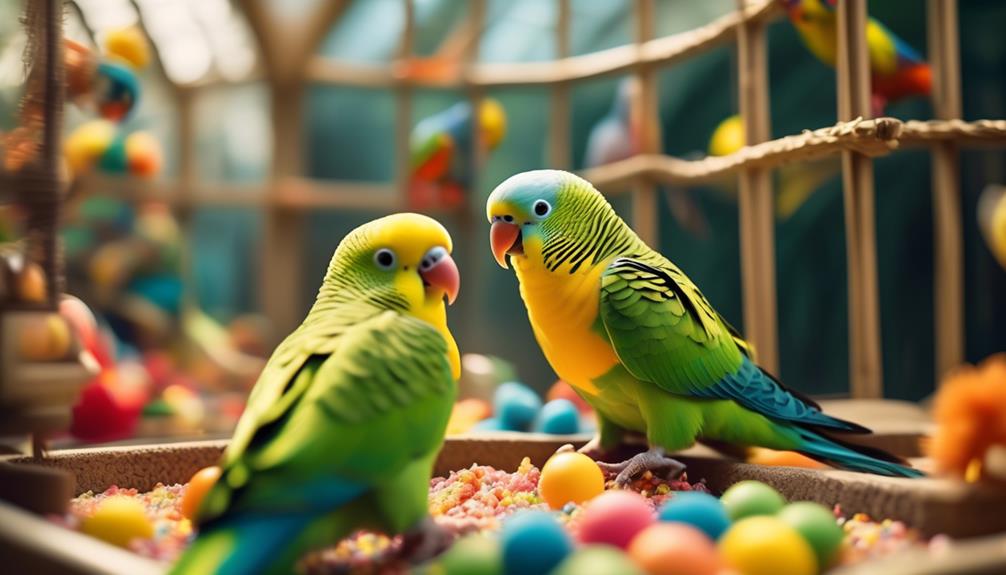
To ensure the happiness and health of your Regent Parakeets, it is essential to follow these tips:
| Tips for Keeping Regent Parakeets Happy and Healthy |
|---|
| 1. Provide a spacious cage for freedom of movement. |
| 2. Offer a varied diet of seed mixes, fresh fruits, nuts, and vegetables. |
| 3. Replace water sources daily to ensure freshness. |
| 4. Allow regular showers for bathing. |
| 5. Engage in regular social interaction and provide toys for mental stimulation. |
Frequently Asked Questions About Regent Parakeets
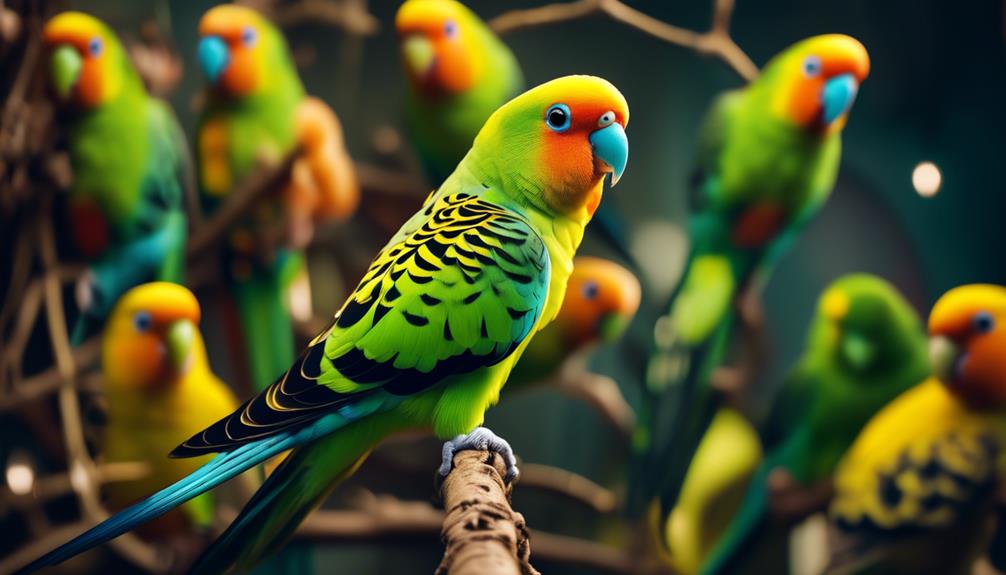
Are you curious about the frequently asked questions regarding Regent Parakeets? Here are some answers to help you understand these enchanting birds better:
- What’s the average lifespan of a Regent Parakeet? These beautiful creatures can live for 25 to 30 years with proper care and attention.
- Can Regent Parakeets talk or mimic sounds? While they may not be as proficient as some other parrot species, Regent Parakeets can learn a few words and mimic familiar household sounds with training.
- What should I feed my Regent Parakeet? A regular seed mix made for parakeets, along with fresh fruits, nuts, and vegetables, should form the basis of their diet. Remember to replace their water sources daily and provide regular showers for bathing.
These are just a few of the commonly asked questions about Regent Parakeets. By understanding their needs and behavior, you can create a happy and healthy environment for these delightful birds.
Frequently Asked Questions
What Is the Average Number of Eggs That a Female Regent Parakeet Lays in a Clutch?
A female Regent Parakeet typically lays an average of 4 to 6 eggs in a clutch. They are known for their docile and affectionate nature, forming bonds from an early age.
Can Regent Parakeets Be Left Alone for Extended Periods of Time?
No, regent parakeets should not be left alone for extended periods of time. They are social birds that require regular interaction and stimulation. It’s important to provide them with companionship and a stimulating environment for their well-being.
How Often Should a Regent Parakeet’s Beak Be Trimmed?
You should have a regent parakeet’s beak trimmed by a veterinarian if it becomes overgrown or if the bird is having difficulty eating or grooming. Regular check-ups are recommended to ensure their beaks stay healthy.
Are Regent Parakeets Prone to Any Specific Health Issues or Diseases?
Regent parakeets, like any bird, can be prone to specific health issues or diseases. It is important to provide them with proper care, attention, and a healthy diet to prevent any potential problems.
Can Regent Parakeets Be Trained to Perform Tricks or Obey Commands?
Yes, regent parakeets can be trained to perform tricks and obey commands. With patience and consistency, you can teach them to do things like wave, play dead, and even retrieve objects.
What Makes the Olive Headed Lorikeet a Charming Bird Like the Regent Parakeet?
The enchanting olive headed lorikeet, much like the regent parakeet, captivates bird enthusiasts with its vibrant plumage and playful demeanor. Its striking green and yellow feathers, coupled with its sociable nature, make it a charming addition to any bird lover’s collection. Both birds exude charisma and beauty.
Conclusion
So, now you have a glimpse into the enchanting world of Regent Parakeets. These vibrant and energetic birds are truly a sight to behold. From their mimicry abilities to their preference for flying in small flocks, there’s so much to learn and appreciate about them.
Whether you’re a bird enthusiast or considering getting a Regent Parakeet as a companion, remember to provide them with the care, love, and attention they deserve.
Happy birdwatching!



